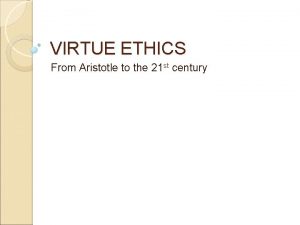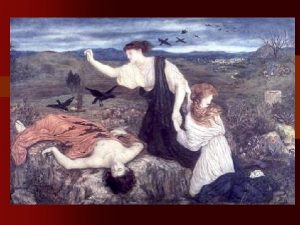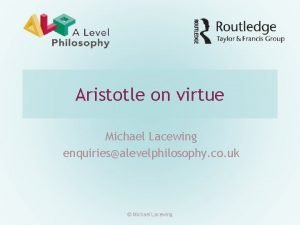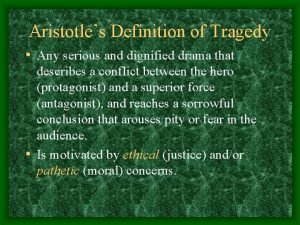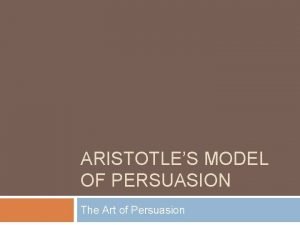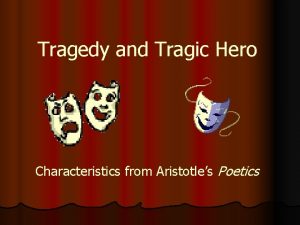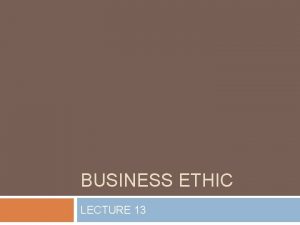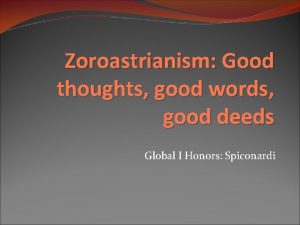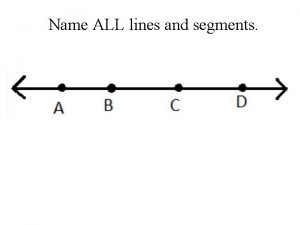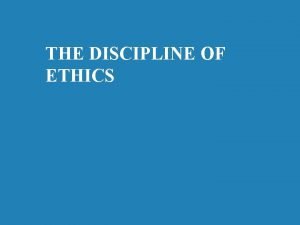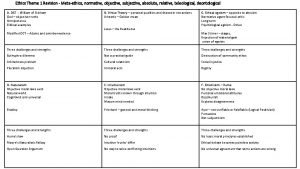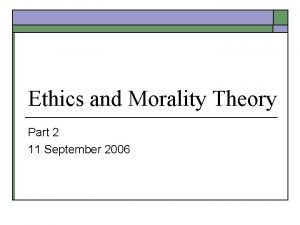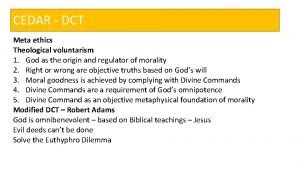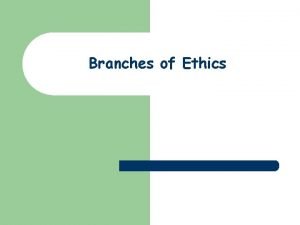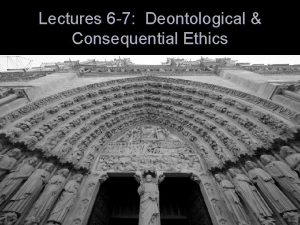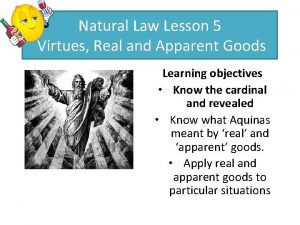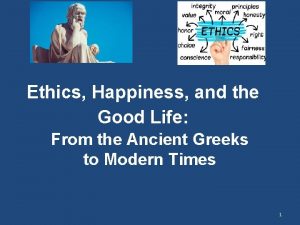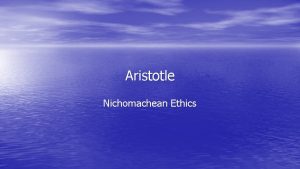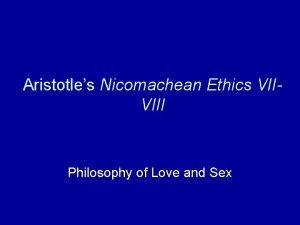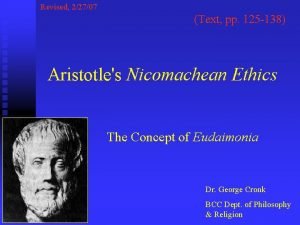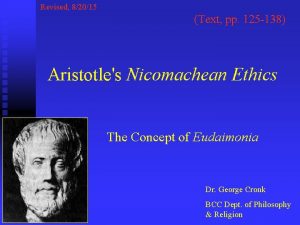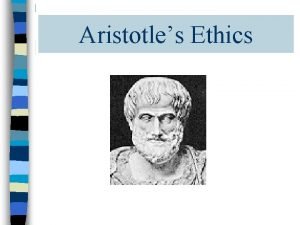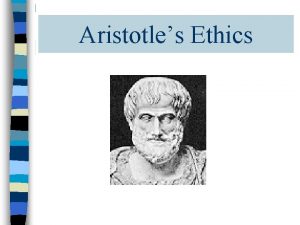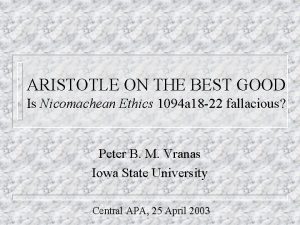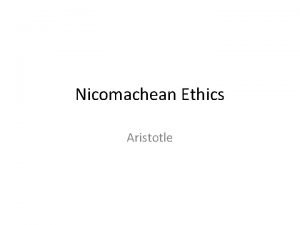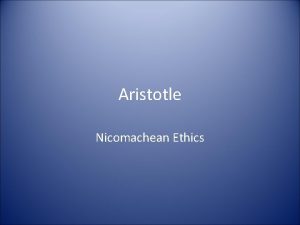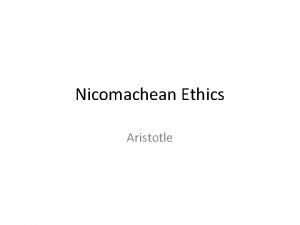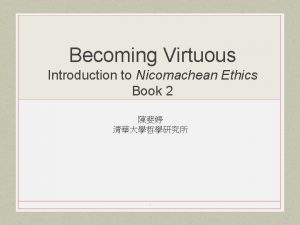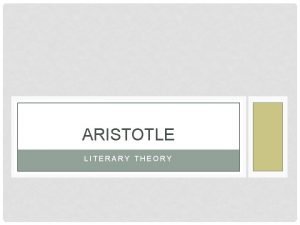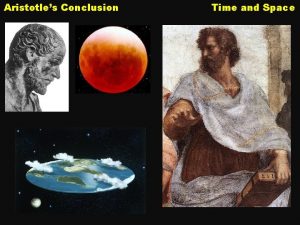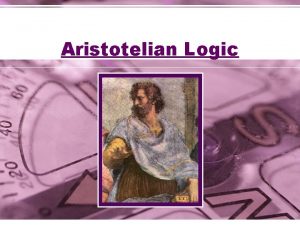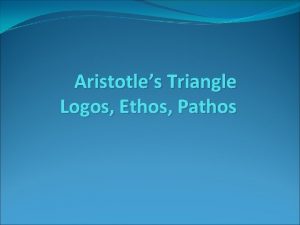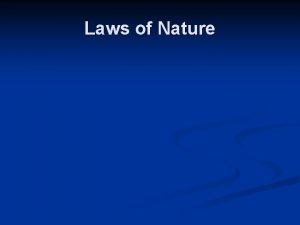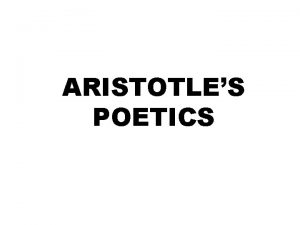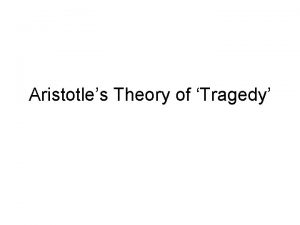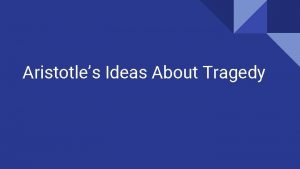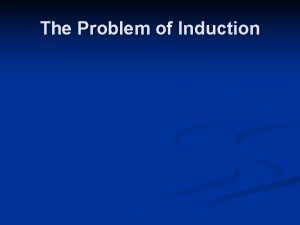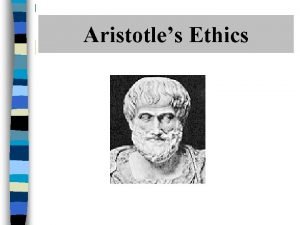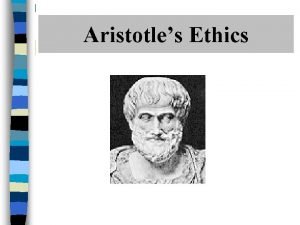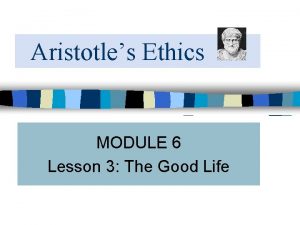Aristotles Nicomachean Ethics n The good what all
































- Slides: 32

Aristotle’s Nicomachean Ethics n The good = what all things aim at n We study Ethics, not merely to know, but to attain the good & to live good lives

The Good for Man = Eudaimonia n n n complete, sufficient a fulfilling human life human ergon = think on/lead a good life = a teleological ethics Defn = “rational activity with virtue” – focused on the goal = how to make my life good/fulfilling?

Major Claims n Ethics = quest for the good n The good = happiness-inrational activity n Possible to attain in a life of virtuous activities together with friends

Contrasting ethical theories Ancient: Modern Relativism n Universalism – ‘Command’ theories n n • Divine Command • Polis laws – Hedonism – Eudaimonist • Socrates? /Stoics: virtue alone = happiness • Callicles: dominance = virtue = happiness Relativism – Existentialism (authenticity-ethics) n Universalism – Deontology (Kant: categorical imperative) – Utilitarianism (Mill: the greater good)

Contrasting Ethical Claims KANTIANS n Categorical Imperative Universal Moral Rules n Possible conflict bet. Moral duty vs. Happiness n Virtue = means to Duty, not ends UTILITARIANS n Utility /Greatest Good = Highest ethical principle n Good = pleasure or greatest happiness n Conflict bet. personal happiness vs. greater good (including others) ARISTOTELIANS: vs. KANTIANS Ethics = ideal way of life, not principles of action n C. I. does not work n Justice = constitutive of happiness n Self-fulfillment in virtue, even in e. g. war n vs. UTILITARIANS Pleasure = subjective aspect of good n Good is happiness, not pleasure n Self-sacrifice for “greater good” may not be just; but may be for “enlarged self” n

Virtue (arete) n n n Virtues of character (moral virtues) – Courage – Temperance – Justice Moral Stages: n Mature, rational person – Chooses own goals, values – Moral + intellectual virtue n – Obedient to moral guidance, sense of honor – Moral-behavioral ‘virtues’ Virtues of mind (intellectual virtues) – Practical wisdom (phronesis) – Philosophical wisdom (sophia) Interpersonal virtue: – Friendship (philia) Maturing self n Immature ego – Acts on impulse/feelings – Opposes morals n Moral Ed changes: • immature ego • moral self • rational person

Moral development n Actions – Voluntary vs. coerced, done in ignorance – Chosen – “habits of choice, ” character n Virtue involves: – Knowing the act – Choosing it for its own sake – A consistent state of character

Freedom and Responsibility (III. 5) Aristotle: • If you know the particulars and • You are not coerced then • You are responsible, even if you don’t deliberately choose to do it. n But if actions arise from character, and it from how we are raised, are we really “free”? n Aristotle’s reply: – Either we are co-responsible – Or, if not, we must still reward and punish to bring out what is better n

Definition of Moral Virtue (II. 6) n. A habit or state of character that expresses a choice n Which finds a mean relative to us n As determined by rational principle, ie. guided by values a morally wise person would see are at stake

The Doctrine of the Mean Virtue (of character) involves striking a mean between extremes of action and passion. n Excess: having too much of something n Deficiency: having too little of something. n The mean is not mediocrity, but harmony and balance. n

Deficiency VIRTUE Excess Cowardice COURAGE Rashness Self-indulgent TEMPERANCE Anhedonic (drunken, glutton, promiscuous) (healthy moderation) (incapable of enjoying pleasure) Cheapness GENEROSITY Wastefulness Self-Shame, Servility PROPER PRIDE Arrogance, Vanity (& high ambition) (low self-esteem) (bloated self-esteem) Exploitative JUSTICE (covetous, dominator) (fair-mindedness) (Altruistic)

Virtue and Self-Control n Aristotle contrasts: – Self-controlled or continent people, who have unruly desires but manage to control them, guided by good judgment (right reason). – Temperate people, whose reason and desires have become harmonized—second-nature— and choose that which is good for them. – Weakness of will (akrasia) occurs when rightthinking people cannot keep their desires under control. (Discussed in Bk VII. )

Courage and Cowardice n courage involves mastering fear courage = willing to give your life for the good you value n no freedom without courage n

Temperance vs. Intemperance Temperate • choose “mean”, willingly limit your pleasures • enjoy temperance n Self-indulgent • E. g. drunkenness, promiscuity • virtue = freely act within limits • vice = “enslaving” n

Justice and Fairness Virtues of Justice = • • Obeying the Law Fairness = willingly giving other his due 2 Forms of Justice • • Distributive Corrective 2 Norms of Justice • • Conventional Natural

Distributive vs. Corrective Justice n Distributive = n Corrective = giving or taking of restoration of goods or evils ‘equality’* between fairly to others, i. e. individuals where according to one has wrongfully proportionality by injured the other merit*/desert *what constitutes ‘merit’ may vary with situation & call for judgment, esp. where participants are ‘unequal’ in their situation *here the differences in merit between the individuals is irrelevant; the ‘superior’ has no more right to harm the ‘inferior’ than vice-versa

Conventional vs. Natural Justice Conventional Right = Justice according to law or the prevailing norms of the society* *These will be at least partly in conformity to natural right, but may be distorted: e. g. laws under conditions of tyranny or oligarchy or communism or other societies that do not value genuine merit Natural Right = Justice according to the laws/actions that fulfill human nature, relative* to wise judgment *These will reflect the ideal vision of a humanly fulfilling society with a realistic appraisal of what can best be attained at the time

Sub-category of fairness: honesty Virtue of Honesty = • • Obeying the rules of the game Fairness = willingly giving the other (competitor) his due Act of honesty • • • Done consciously Choose for own sake Act of character Relation to other virtues • • NOTE: honesty implies either (i) other-directed sense of honor & shame (pre-adult virtue) or (ii) personal sense of honor & principle (adult virtue) • • PRIDE: Self-respect, highmindedness, integrity PRACTICAL WISDOM: True v. false self-presentation (vs. ‘cleverness’, self-deception) FRIENDSHIP with self, others HAPPINESS in genuine accomplishment

Virtues of the Mind n Art e. g. sculptor, doctor – Makes particular useful things – They wouldn’t otherwise exist n n – Deliberative skill re: means – Right values (ends) – Self-knowledge – Unity of Virtue Science e. g. chemist – Deduces from necessary, universal laws – Not concerned with particular things/events n Intuitive Reason = – Realizes principles/facts are ‘ultimate’ – Recognizes principles in practical situations Practical Wisdom n Theoretical Wisdom – Logic, Physics, Ethics – Vision of “God”

Moral Knowledge is like Art (techne, craft) n Goal-oriented n Perception of, feel for the situation (nous) n Brings about useful, noble particulars, which otherwise don’t exist n Grounded in desire, not cognition n ‘Truth-in-action’ more than in logos Science (episteme) n Truth-revealing n Awareness of universal principles, human nature n Skill in deliberation and reasoning n Involves knowledge of self, others n Particulars exemplify universal values

Weakness of Will Socrates: “No one can know the good and not choose it. ” n Common view: “People can know what they should do, but still choose not to do it. ” n PARADOX: n How can you choose to do what you know is not good for you? Who knows? Who is choosing? n Compare: how is self -deception possible?

Aristotle’s Solution “One can have general knowledge but, moved by passion, not apply it. ” n PARADOXES: – Chronic weak-willed do not “choose” – Chronic weak-willed not = “one self” SOLUTION: n vs. Socrates: – ‘abstract knowledge’ is possible; – ‘knowing’ is not = doing. n vs. Common sense: – Cannot ‘know’ in situ and still choose bad – ‘voluntary doing’ is not = choosing – Person can lack ‘moral self-unity’

What is Self-Love? n Is it good or bad? n Self-love based on virtue is good n We should love ourselves, be “caretakers” of our virtue and well-being (compare Apology 30 b) n Care of our psyche will involve care of our ‘works’ (theoretical and practical), but value process/virtue over outcome/success

“Art” of Self-Care? Socratic theme n Central value = integrity n Self-friendship = preserving ethical balance in midst of actions, emotions n Phronesis “evaluates” life’s opportunities with n – good reasoning – right values (justice, noble beauty) – concept of ‘full life’

True Self-Love Self-care, selfrespect (proper pride) n Having good goals n (wisdom) n Sticking to goals (courage, temperance) n Acting to promote flourishing in yourself, others (justice, friendship)

Friendship (filia) Friendships of – utility – pleasure – virtue n Friendship = bridges egoism / altruism n True friendship – based in self-love – “expands the self” n

Is Altruism Possible? Ethical egoism = seek good for oneself. n Altruism = do good for another (for their sake) n Counterexamples: – sacrifice for child, friend who betrays – Still do it? n Friendships = alliances for mutual benefit or emotional attachments (temporary? longlasting? ) n ARISTOTLE n Friendships: most egoistic = based on pleasure/utility n Perfect friendship – – – n Based on virtue mutual recognition Non-competitive includes pleasure, utility Friend is “other self” Self is “expanded self” Friendship & Egoism – bridges gap between egoism and altruism – Even “self-sufficient” virtuous person needs friends

The Good Life and Politics subjective vs. objective good – pleasure/joyfulness vs. happiness/flourishing n 2 forms of “the good life” – contemplative (theoria) • Vision of God • Perfect happiness – active (praxis) • Imperfect happiness • Necessary & good n

Puzzle: What is the Telos? Dominant End n Goal = activities aiming at truth; or liberty and justice n Life-actions are subordinated to one great goal n Fulfillment in goalachievement Inclusive End n Goal = inclusive balance of goods within a form of life n Self e. g. politician, business, family life, physical life n Performative balance in a good life Which is Aristotle?

Answers to Skeptics To Egoists and ‘Immoralists’: why be moral? n A: No one can find peace and fulfillment without a rational, friendly relation to others. To Hedonists: n A: virtues and even external goods are not good b/c they are pleasurable, but are truly enjoyable b/c they are good (=conducive to rational flourishing, fulfillment) To Relativists: n A: some individuals’ and some societies’ ethics are more deeply fulfilling of human nature than others (the fact people disagree does not mean there is not a true answer to the question) To Pluralists: n A: some individuals’ lives are more fulfilling than others (the life of the mind and the life of politics are fully satisfying in ways that a life of art, or a life of business and family are not; yet many contemporary Aristotelians reject this, and the dominant end model of life)

Aristotle’s Politics I n rejects Republic as contrary to “natural law” —humans by nature desire/need: – Family life – Property of their own – Share in governing themselves (except for “natural slaves”)

Aristotle’s Politics II: rule by philosopher-kings impossible; men need the rule of law n GOOD GOVTS – Constitutional Monarchy – Constitutional Aristocracy – Constitutional Republic; blends other forms n BAD GOVTS – Tyranny = rule by fear (lawless) – Oligarchy = govt by the rich – Democracy = rule by working class (least bad)
 Rosalind hursthouse
Rosalind hursthouse The tragic hero characteristics
The tragic hero characteristics Aristotle virtues
Aristotle virtues Aristotles unities
Aristotles unities Megalopsychia tragedy definition
Megalopsychia tragedy definition Aristotelian tragedy conventions
Aristotelian tragedy conventions Aristotle model of persuasion
Aristotle model of persuasion Aristotles tragic hero
Aristotles tragic hero 5 myths of business ethics
5 myths of business ethics Good deeds good thoughts good words
Good deeds good thoughts good words Hi good morning how are you
Hi good morning how are you Hello good afternoon teacher
Hello good afternoon teacher You are good when theres nothing good in me
You are good when theres nothing good in me Good afternoon me
Good afternoon me Name all the rays
Name all the rays Descriptive ethics
Descriptive ethics Realism vs anti realism
Realism vs anti realism Micro ethics definition
Micro ethics definition Valuing time in professional ethics
Valuing time in professional ethics Methaethics
Methaethics Descriptive ethics vs normative ethics
Descriptive ethics vs normative ethics Beneficence
Beneficence Meta ethics vs normative ethics
Meta ethics vs normative ethics Descriptive ethics vs normative ethics
Descriptive ethics vs normative ethics Deontological ethics
Deontological ethics Teleological ethics vs deontological ethics
Teleological ethics vs deontological ethics Secondary precepts list
Secondary precepts list Cp ellis
Cp ellis Hình ảnh bộ gõ cơ thể búng tay
Hình ảnh bộ gõ cơ thể búng tay Ng-html
Ng-html Bổ thể
Bổ thể Tỉ lệ cơ thể trẻ em
Tỉ lệ cơ thể trẻ em Chó sói
Chó sói
